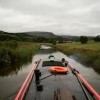Search the Community
Showing results for tags 'alternator'.
-
My domestic alternator has stopped charging and the duff alternator has no ID, see pics. I'm at a bit of a loss to how I find a direct replacement. Are 'car' alternators interchangeable? I'm hoping to have a self-sensing replacement.
-
Three weeks ago I had my engine serviced, alternator replaced and the belt too. It snapped yesterday whilst I was charging our batteries. Is it possible that the new alternator isn't correctly aligned? Or the belt was to tight or just duff? Or is the alternator to big for the belt. Running on a BMC 1.8. One 10mm belt for water pump and 90amp alternator. They said they would usually only fit a 70amp alternator to that size belt (to which I said "that's fine") but they ended up sticking a 90 on it (Which is what was on there before and I was going through a belt once a year or so...) I have a recently installed a Stirling alternator charge controller, I think that this increases the load on the alternator, so that might be why it's too much? There isn't any room increase in belt thickness or add an additional belt as the engine is right next to a bulkhead, so the whole lot would need moving backwards... Presumably possible but pricey? Any ideas? Should I just buy a smaller alternator and get someone to fit it?
-
Can anyone identify this alternator attached to my 1989 XD3P 2.5 l engine? It needs replacing with any alternator that will fit the space/brackets
-
Hi there, I’m fairly new to boat building and am in the initial stages of fitting out my boat. I did have a look but couldn’t find anything on the following questions. I have a couple questions that I could really use an experienced boaters expertise on: I currently have a 55hp canalline engine onboard with the normal two alternators, the domestic is a 12v 175A alternator. My first question is: does anyone have experience with replacing it with a larger alternator? For example a 24v 400A alternator? If yes, how did it go? How did you mount it? I appreciate running your engine is not pleasant for boating neighbours and know about the restrictions in time when running it. In order to prevent the alternator from running at idle and not pulling through that many amps, is there anything stopping me disengaging the gear wire on the engine and throttling a little bit? At the moment the main thing I’m trying to work out is if I should fit a bigger alternator and run the engine for 45mins a day or go with solar and run the risk of it getting stolen in London. I’m sure I will have loads more questions in the future but to start with thanks for your help with these two.
- 28 replies
-
- alternator
- engine
-
(and 2 more)
Tagged with:
-
Hello!, I've been helping my friend install a new alternator onto his Isuzu engine. We are totally stumped on how to get this thing wired in. It is installed on the engine and the belt has been tensioned, however when we start the engine and rev it a bit the voltage on the batteries do not increase. I'm clueless about alternators and my friend has tried wiring it up as follows: + bolt terminal ----> +ve terminal on first leisure battery W bolt terminal ----> -ve terminal on first leisure battery AUX ----> he found a wire coming from the engine with a female spade connector which appears to connect to this, he tried with it connected and without it connected This is surely looking very newbie to you guys right now, but we are out of ideas and would really really appreciate any help or advice as he has had no power since he bought the boat. Cheers in advance for any and all help!
-
Hi, I won't go into all the history of why I need this but I have a damaged Adverc (Negative) and an alternator which I am pretty sure is wired for the opposite type. I have no details on the alternator make it is a refurbished grey painted unit with no markings apart from the terminals. There is a picture of the alternator attached. I don't want to get the Adverc fixed until I have the alternator sorted. They have offered me a new alternator but it does not have the correct multi ridge pully that my engine has so it would need more alteration etc. Does anyone know if it is easy to a) Check that the alternator has the incorrect set up i.e. regulator on non earth side of field brush. b) Re wire the alternator so that it will work with the other polarity Adverc. I'm guessing the answer is no but worth checking. In which case where could I pick up a good 12V 110 Ah ish alternator which is suitable for a Negative Adverc. Engine is a Beta 38.
-
Could somebody tell me what this alternator is please? I know the output is a staggering 30 A or so but it only charges the start battery which is rarely used as I prefer to hand start. Thanks N
-
I have a mains fridge setup with a 1600VA inverter and it works fine. As you would expect when the engine is running and the compressor kicks in, the alternator pulls the revs down. This is not really a problem but I do wonder why the alternator voltage regulator has to be set so sensitive given that the inrush required to start the compressor only lasts for <500ms. I was wondering if it was possible to install a remote voltage regulator and then add some sort of passive filter in the voltage sense to effectivly slow the regulator response, thus avoiding the engine rev dip and all the assoociated stress on belts etc.. Ant thoughts?
-
I have recently been given a Victron battery monitor BMV600 and am looking to add it to the boat. The installation of the shunt seems simple enough if you have one battery but with a bank of three domestic batteries there are options available and I am concerned to choose the best one. Looking at the current wiring of the domestic batteries it doesn't seem that the batteries are currently wired in the best configuration (though I'm not sure about that). I'm aware of the Smartgauge site and Option 2 where the positive and negative 'take-offs' should be diagonally opposite one another and that seems to be what I have presently (1st image) Intuition suggests that the alternator connections ought to be made in a similar sort of way but that is not presently the case; they being connected to the middle battery of the three. I'm thinking that the shunt should be added with some minor changes (as shown in image 2) but am not at all sure about this. I've looked at info about alternators/charging/etc on this and other sites but have not found any info that gives me the confidence to proceed with this change. Any comments would be most welcome. There are two alternators on the Isuzu engine which appear to charge the starter and domestic batteries separately. Thanks in anticipation of some helpful advice
- 38 replies
-
- sunt
- alternator
-
(and 2 more)
Tagged with:
-
We have a Beta 43 engine with twin alternators. The domestic 150A alternator charges four domestic AGM batteries which are now just over 2 years old. The boat and the alternator are nearly 9 years old. Normally the domestic alternator charges at a voltage ranging from 13.8 to 14.5 volts. On a recent trip it was charging at 14.8 to 15.2 volts. The batteries were not hot after several hours at this charging rate. I have no way of measuring the current at which it was charging. Should I be worried about this and what might be the reason? We have no separate regulator between the alternator and the batteries. We do have a solar panel (100W) charging the same four batteries through a regulator. The solar installation is also about 2 years old. Any ideas?
- 6 replies
-
- charging
- alternator
-
(and 2 more)
Tagged with:
-
Hey everyone, new to boating and still very dumb about it but trying to learn. The problem relates to the batteries, I have a solar panel and charger and the charger tells me the voltage of the batteries. When I charge them via the engine, the voltage can go up to 13 - 13.2 volts which says to me they are charged but it only takes an hour or two. I've been told I'm not charging them for long enough but if I leave it on charge for longer it generally stays the same voltage the whole time and when I turn the engine off, it goes to 12.9-12.7 which I'm aware is fully charged. An example today is my voltage was at 12.2 so I charged the batteries for 2 hours, the batteries were at 12.7 when I finished charging and they're back down to 12.2 again after only 2-3 hours even though I've only had LED lights running and 1 usb charger for a mobile. What I'm basically asking, which has been mentioned on my previous posts, are my batteries knackered or do I need to leave them charging for longer regardless of what my controller says? I've ordered a generator and battery gauge so hopefully that will give me more answers. Thanks! Oh also, I have 2 x 110amp leisure batteries.
-
Hideehi wondrous canal-skaters! Our engine room is a mess! The floor above the engine is held up by bits of wood, nailed into other bits of wood, which are glued to the paint on the hull..... several rust patches attest to the silliness of this plan! The glued bits of wood seem to be for guiding things like fuel lines ... not for load-bearing! Eventually, I want to build a new platform above the engine, with a steel frame. It should be much quieter, boxed in. Even so, when walking between the engine room and the boat, we have to step over this great big alternator, which is often moving! One should not wear flowing cotton dresses when crossing this point, which is a shame. We have two alts, one at 110Amps for the 450AH leisure (above) and a smaller one (90ish Amps) for cranking. The engine is an Isuzu 42. My plan of the moment, is to either move the larger alternator to the opposite side of the engine, or to just swap it with the smaller one. If I move it, it'd have to be mounted not on the engine, but on a piece of steel I'd have fabricated, mounted on the same girder that the engine is mounted on. If I swap it, the now lone alternator would have to charge both batteries. I don't think that this would be a problem..... both are charged by a fairly large solar panel; we stopped for two weeks without running the engine, and had no problems. That said, split relay charging systems have their own issues. The 110A alternator is on the left here. I think it could be mounted on the girder on the right, if I invert it 180 degrees, keeping the wheels lined up. Not sure if the direction of travel matters, or if it can't be mounted on the not-engine. (I figure that the fanbelt with absorb any movement?) Any ideas/input/abuse enthusiastically received!) PS, it's nearly 3am, and I'm sat in the fields, in a canal drinking good scotch, using my laptop with wireless broadband, powered by solar energy*! Life is good. . *and a little bit of diesel
-
We have a Victron Phoenix Multiplus 12v/3000 inverter charger, connected to 5 AGM batteries (675ah) monitored by the BMV 602. For the last five years it has worked very well. Normally whilst cruising the domestic bank of batteries is charged up by the large DC alternator (we have a smaller DC alternator for the starter batteries and an AC alternator with a Dometic travelpower). We normaly lose about 18% charge overnight and the DC alternator begins putting in about 80 ah's dropping to about 16 after 4 or 5 hours cruising. It drops lower slowly and if it remains constant for about 15 mins it is considered full (although i know this is not strictly true). I occasionally sync the BMV, once I now the batteries are as charged as they can be, usually when on shorepower and no real load. Occasionaly whilst running AC appliances (washing machine, or carpet sweeper) the Amp/hour rate goes up by 10 to 15 % the multiplus taking the extra energy from the AC alternator. This becomes negligble fairly quickly. Our problem now appears to be that the BMV does not read the output from the alternator. In winter we normally fully charge the batteries and leave some greenhouse heaters in the boat connected to the shorepower. The battery bank has very little load so we visit once a month to run the engine and charge up the batteries amongst other maintenance tasks. On our recent visit the BMV state of charge showed 74% initially but as soon as I started the engine the display changed to 100% in seconds. The rate of charge/discharge showed +3 ah dropping quickly to +1ah not the +80 plus ah as expected and normal. I considered that the alternator wasnt working but it appeared to be doing so, I started up the travelpower and put a load on the AC system and that should have had an impact on the BMV but didnt. I dont think either alternator has failed so my thoughts are that the BMV must have reset itself or shorted out somehow. It later showed a minus value as some of the lights were on in the boat. All indicators show that the BMV is not reading any input. The values held in the memory of the BMV show the same as previously I.E. the total AMP Hours of the battery bank. It seems like the BMV is not reading the input from the alternators. A blown fuse or similar is what we are hoping is the solution but where to look is our problem before we call in a Victron trained engineer This year the boat has seemed colder but we have used the same regime in other marinas. Any thoughts gratefully accepted regards Malcolm & Anne
- 12 replies
-
Melaleuca has an electronic tachometer, driven from the W terminal on the alternator. The tacho is made by VDO and the alternator is a bog-standard A127. The tacho has started to misbehave when the batteries are charged and the charge-current reduces to a low level. The reading becomes erratic and then falls to zero. I can see why, in theory, this might happen, but it never used to. The alternator was stripped, cleaned and checked over the winter, and this behaviour is since that was done, but that may be coincidence. There's an ammeter on the alternator output, so I can be sure it's working as usual. There's an Adverc controller attached; taking that out of circuit doesn't help. Any suggestions for things to check/fix or ways to overcome the problem. MP.
-
We've had our n/boat for just over a year and I've never had a lot of confidence in the original Barrus Shire 10 year old instrument panel which had a suspect ignition switch (lose, floopy key slot) and a tacho that never moved. So I replaced it with the latest version which I rather naively thought would be a straight swap - Same size, same block connecter etc. There was however some wiring mods needed one of which was due to now having individual battery/alternator lights for both the starter battery and the leisure batteries. I explained this to Barrus as they originally told me it would simple swap and they, all credit to them, sent a guy out to the marina within 48 hours to modify the block connector etc to get things connected. However he identified that the starter battery wasn't charging due to a faulty alternator which was the reason for the tacho problem and the battery/alternator light staying on. So it was frustrating that having fitted the newly refurbished alternator, both the above problems still continued. However following a suggestion from another marina colleague, I disconnected the LED bulb and holder from the back of the panel and reconnected to a traditional 12 volt/2w bulb and holder. On starting up....hey presto the light went out and the tacho needle sprung into life!. So....whilst some might say - well that's the problem sorted....I am puzzled by such things? Comments welcome but please bear in mind those of you who posses a far greater understanding of electrical matters that my knowledge is limited and I am merely keen to know whether by simply changing the bulb from an LED really has solved the problem and why the starter battery alternator would work with the LED? Thanks in advance
- 59 replies
-
- tacho
- alternator
-
(and 1 more)
Tagged with:
-

Prestolite Leece Neville alternator voltage
Capella247 posted a topic in Boat Building & Maintenance
Hi all, My Leece Neville alternator is kicking out >15.7 - 17 volts on anything but tick over. I have brand-new starter battery and leisure batteries. The alternator has a voltage adjustment screw on the regulator. I have tried adjusting this and it seems to be completely randomly adjusting the voltage - turn clockwise it rises and then suddenly drops similarly anti clockwise. It looks like the previous owner has already played around with it. The lowest I can get it is around 14.88, which I am guessing from reading up on it is still too high. the batteries are full having cruised for 8 hrs yesterday, solar panels etc... the voltage didn't drop all day. The Cyrix ct relay has hopefully protected the leisure batteries as it only cuts in beneath 15.7 volts. given I think the voltage regulator screw isn't working very well I was thinking about replacing the regulator - anyone know a good place to buy one, struggling to find anything on line in the U.K? It's an 8rg2043 ANy one had any similar experiences Or advice or thoughts? will take into a auto electrical place if this isn't a diy job Cheers tom -
I'm not an electrician so need help. Isuzu 35 engine with standard wiring and engine control panel. Problem:- Control panel warning buzzer is sounding, not continuous but with frequency increasing with engine revs, and engine alternator warning light is similarly showing. On board electrical panel indicates engine alternator is pushing +14.4V and charging amperage is satisfactory (as is auxiliary alternator), both engine and auxiliary batteries charge fully no problem. Both alternators bench checked OK so, looking at the Isuzu wiring diagrams I see 3 diodes at warning buzzer and thought I'd check them. NO JOY! Can't find diodes in panel wiring at all but do find 2 resisters (CGS SBCHE4 47R J PW LA) which according to the diagrams ought not be there. Shall be grateful if someone will tell me what's going on as the sound from the warning buzzer is driving me crackers and I don't really want to disconnect it as it serves as warning for oil pressure and water temperature as well as engine and auxiliary electrics.
- 16 replies
-
- diode
- alternator
-
(and 1 more)
Tagged with:
-
Hi there new to the community so I hope it's alright to create a new thread. The narrowboat I'm currently looking to purchase is set up with an alternator, 3 new 12v batteries, no inverter, mains cabling throughout. There is also a generator on board. I'm sorry I can't provide specifics at this point, but even general advice much appreciated. If I continue with the purchase, I'm intending on putting on 4 Renogy 100 Watts 12v Monocrystalline Solar panels and doing my best to use the engine for power as minimally as possible (going into winter I realise that the solar is not going to give much power). The current owner will also be putting on a new 12v Fridge if I go ahead with the purchase. The appliances I intend on running would be a toaster, iron, TV, record player, iMac (I already own this and not looking to replace it), Laptop charger, Mobile charger. I'll be replacing all the current lighting with LED. There is currently a Washing Machine on board but the owner says its best to remove it as its on the mains (makes sense, although I would consider keeping it if anyone could provide a realistic solution). Stove and oven will be gas, have yet to decide on a water heating system. The current gas boiler is defunct. Currently considering a new gas boiler or a back boiler for the burner (no burner currently on board looking to purchase) to fuel hot water (taps, shower) and heating (there are radiators throughout but I'm not sure if they would be necessary once I purchase the burner - she's 63'. To be clear I will not be mooring up and 'plugging in', so everything needs to be off grid power. My knowledge is limited so being completely open, I apologise if my questions appear naive any support appreciated: Is it better to consider investing in a good inverter, or should I look at transformers on an appliance by appliance basis? If primary usage was 12v, would installing an inverter affect functionality or can you run both 230v and 12v with an inverter? I'm not particularly keen to keep the generator but would anyone advise that I do and why? Instead of an inverter or transformers would anyone's opinion be that I simply run the engine (with alternator) when using non-12v appliances, and why? I want to reduce emissions and costs from over using the engine unnecessarily wherever possible. Will the current 'all mains' wiring cause any problems with purchasing 12v appliances e.g. the fridge. If I wanted to consider keeping the washing machine what would you recommend having in place? Thank you for your advice.
- 45 replies
-
we have 2x 230ahc 12v Haze gel maintence free batteries, and a NASA BM-1 battery/charging monitor (which i love!). Before i start the engine, the BM1 reads: 13.5V Charging 2.4a (from Solar - inverter off, no 12v load) 88%C Time to Charge 25hr. 731 Int Ahr. I start the engine and.... Between 15.2 and 15.4V Charging between 1.2 and 4.2a Time to Charge between 9.3hr and 77hr. 732 Int Ahr Is this voltage too high?? ALSO the D Battery warning light is flashing about once per second with an accompanying chirrup and a "hunting" of the engine revs - this at about 1200 rpm. Nothing above changes at 1400 rpm and a good engine rev makes no odds. At tickover the warning light is solidly on. The engine is a Beta38 with a 100A alternator.. The Label says : LSKRA 14V 100A. (AAK5535) We both have a week off next week so i'm thinking of getting someone to look at it, BUT.. Am i likely to "fry" the batts at 15.4v if i take a few hours to chug from the bottom-ish of the Ashby to (say) Springwood Haven? (EEK! ) Any one else know any marine sparks up this way ? Currently @ Trinity Marina but supposed to be moving to our new mooring between bridges 4-5 on the Ashby on Saturday (soooooooo happy about this!! )
-
I'm sure everyone remembers my poor charging regime and the lengthy thread that ensued. I'm still using my set of somewhat reduced capacity 4x110ah batteries - a couple hours engine running in the morning, a couple in the evening, and then switch off the 240v (including fridge) at night. This gives me enough laptop time in the evening, led lights and various pumps etc. So, for now carrying on quite happily - but I have noticed a new phenomenon creeping in lately. Today for example: I ran the engine for an hour or so when I got up (with 240v back on as normal). I then cruised for 3 1/2 hrs. A couple hours later, and my batteries are already back down to 12.3v so I have fired up the engine again. What I am saying is this - it would appear that the leisure batteries are not getting much (or any?) charge when I'm cruising. I can't think what this could be but I'm sure someone will enlighten me - be gentle! Just to re iterate - I know the batteries have reduced capacity, but a couple hours charging off the engine normally sees them up to say 12.8v which lasts all day or all evening. Even on longer cruises, they don't seem to get as much charge as when the engine is just running in neutral. I have two alternators, 50a for engine, 175 for leisure.
- 41 replies
-
I'm after a twin 2 1/2 inch O/D pulley to fit a CAV taper shaft alternator. I've searched the interweb without success. I think I know the answer but anyone know where or if pulleys can be purchased for CAV alternators.
- 10 replies
-
The regulator on my alternator is set to 13.8V. When I end a cruise and go on shore power it takes hours before the battery is fully charged. Would it be a good idea to use the 14.5V setting or would this cause damage to the batteries when cruising for eight hours a day? Would a battery controller be worth fitting? Is Adverc still the best choice?
- 146 replies
-
- niehoff
- alternator
-
(and 1 more)
Tagged with:
-
Here is a copy of what I sent to Adverc yesterday. They are enjoying their weekend, I suppose, so I thought that I would ask the opinions of the forum What do the cognoscenti reckon? Nick
-
Hi there, I've got one of these (see pic below), but want to change it for something that can take more solar panels and is a bit more modern. We use it with a 60A alternator, and 1x 100w solar panel (although I think this regulator can only take up to 60w solar. We don't have a wind turbine. It only seems to produce a max of 14.1v when the engine's on (even after hours of cruising) and recently has been hitting 15.1v through the solar panel - which seems a bit high?! I'd like to replace it with a charger suitable for the alternator, and maybe solar as well. Do I need to get a separate charger for the alternator, then an MPPT charger for the solar panel (I also want to add either one or two 175w solar panel to make 275w or 375w in total). We have 3x 110ah leisure batteries and a starter battery, and a Sterling 1600W pure sine wave inverter that is yet to be hooked up.. Any advice, brands, models to watch out for etc, most welcome! Cheers, Alistair
-
Was chatting to wife when I heard a distinct ripple in the sound of the engine. Not so much an up and a down, a bit like we had the washing machine on and the engine altering the load only, nothing was on. Then a return to a quiet too quiet smooth engine sound and upon inspection I noticed the red light was on and the battery monitor was reading negative amps. We had of course decided we weren't moving on .... how times change. Late in the afternoon we moored up at Braunston ready to hit the locks tomorrow. I might add, like all good scenarios, the batteries were sort of charged to 90% give or take a bit of innaccurate resetting Anyway, point is, we had sufficient power for tonight. Spoke with Adrian at Beta Marine and a new 100amp alternator for £135+vat seems not too unreasonable but first we will have to get ot our winter mooring, Yelvertoft, ASAP so we can get an electrical hook up. What really is truly amazing, we have a Honda 2kW suitcase generator but sadly no petrol! Enquired at Braunston to see if any petrol going and quite indifferently informed that the local petrol station at Daventry, was 5 miles away. Fair enough, won't bother to ask how much for an overnight stay, and no I don't want a hook-up ty v much .... I have checked out all the connections, so I don't expect any real surprises when I start up the engine tomorrow but who knows ... Christmas might come 2 days early .... we shall see :)



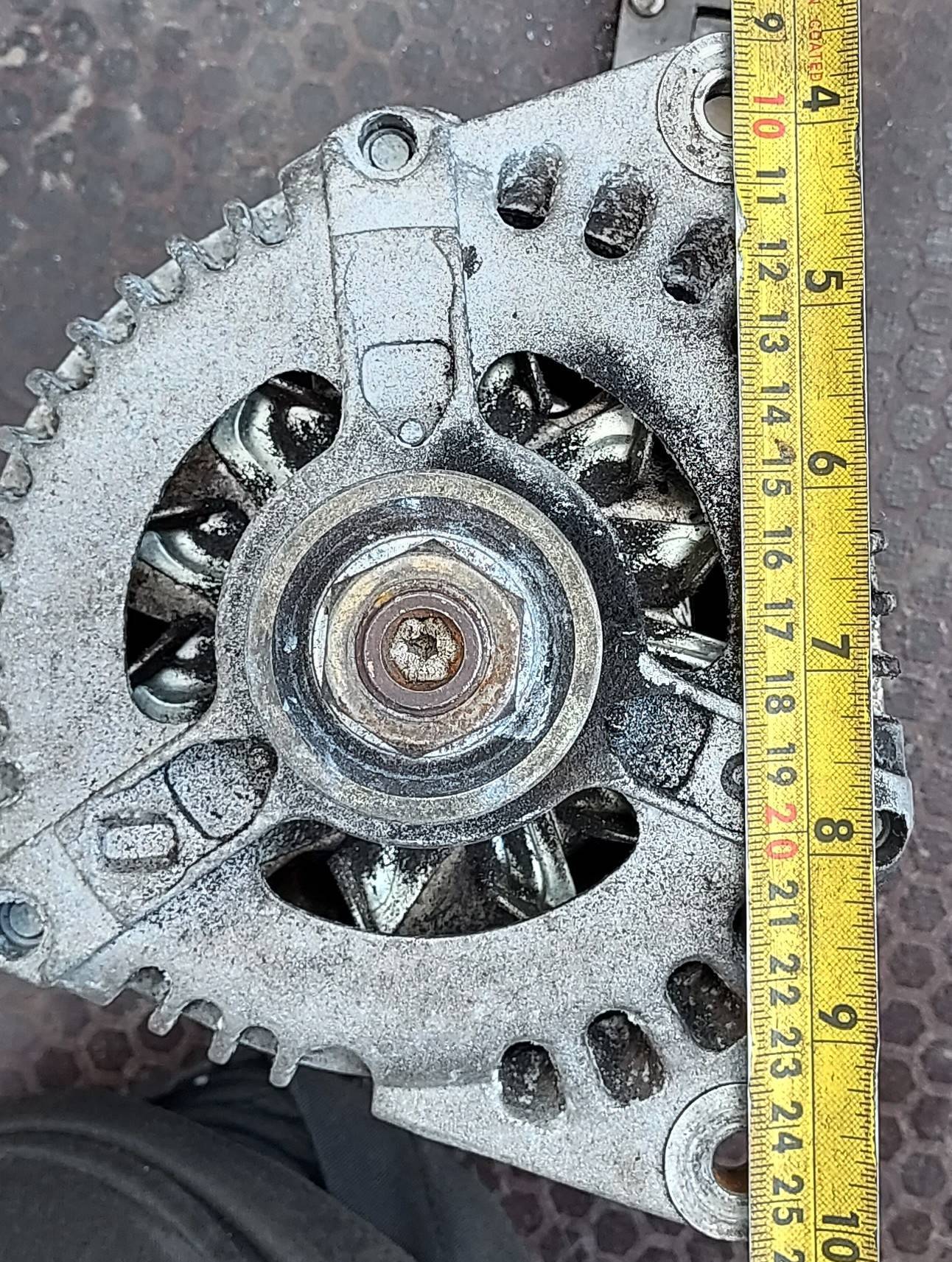

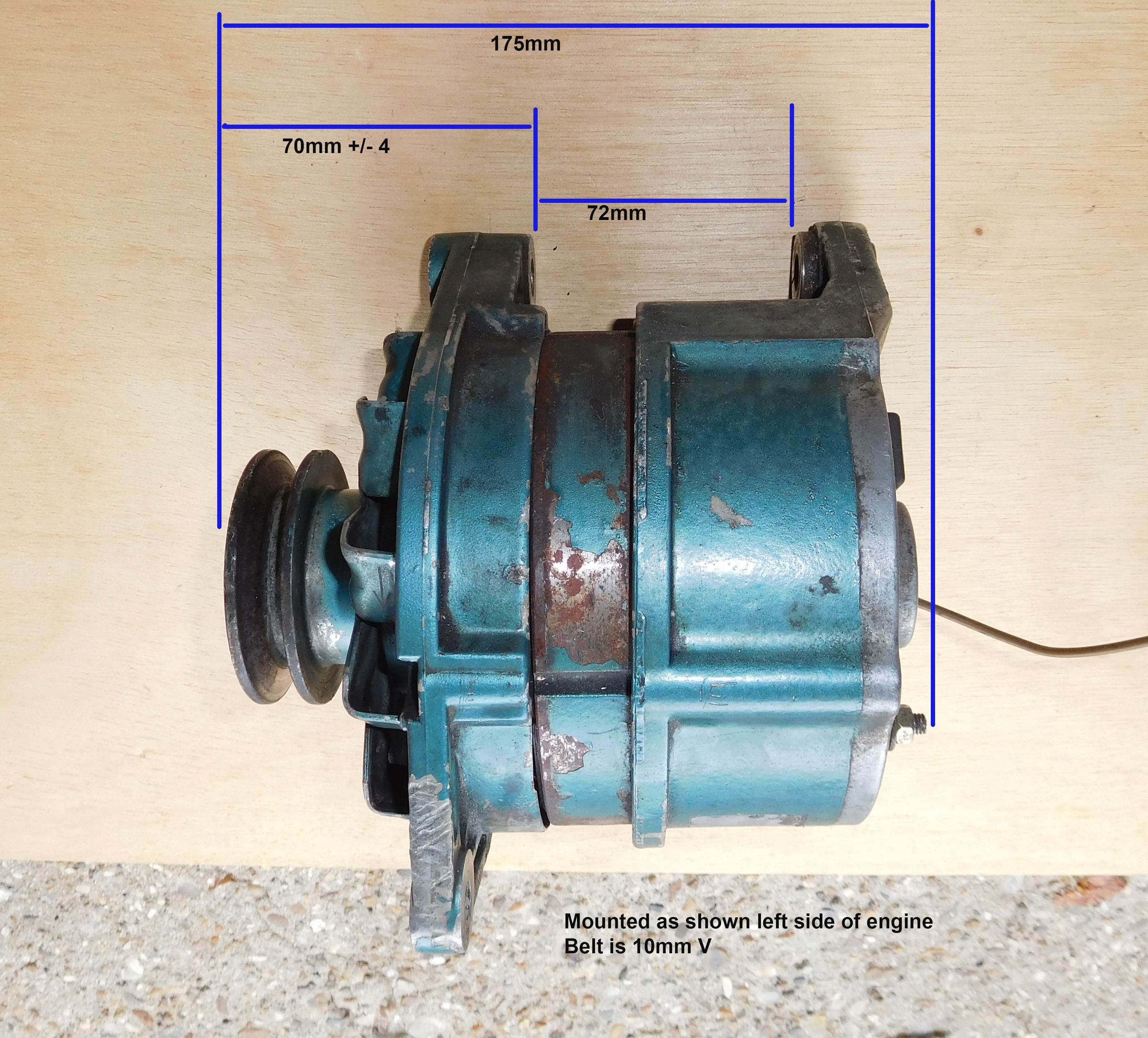
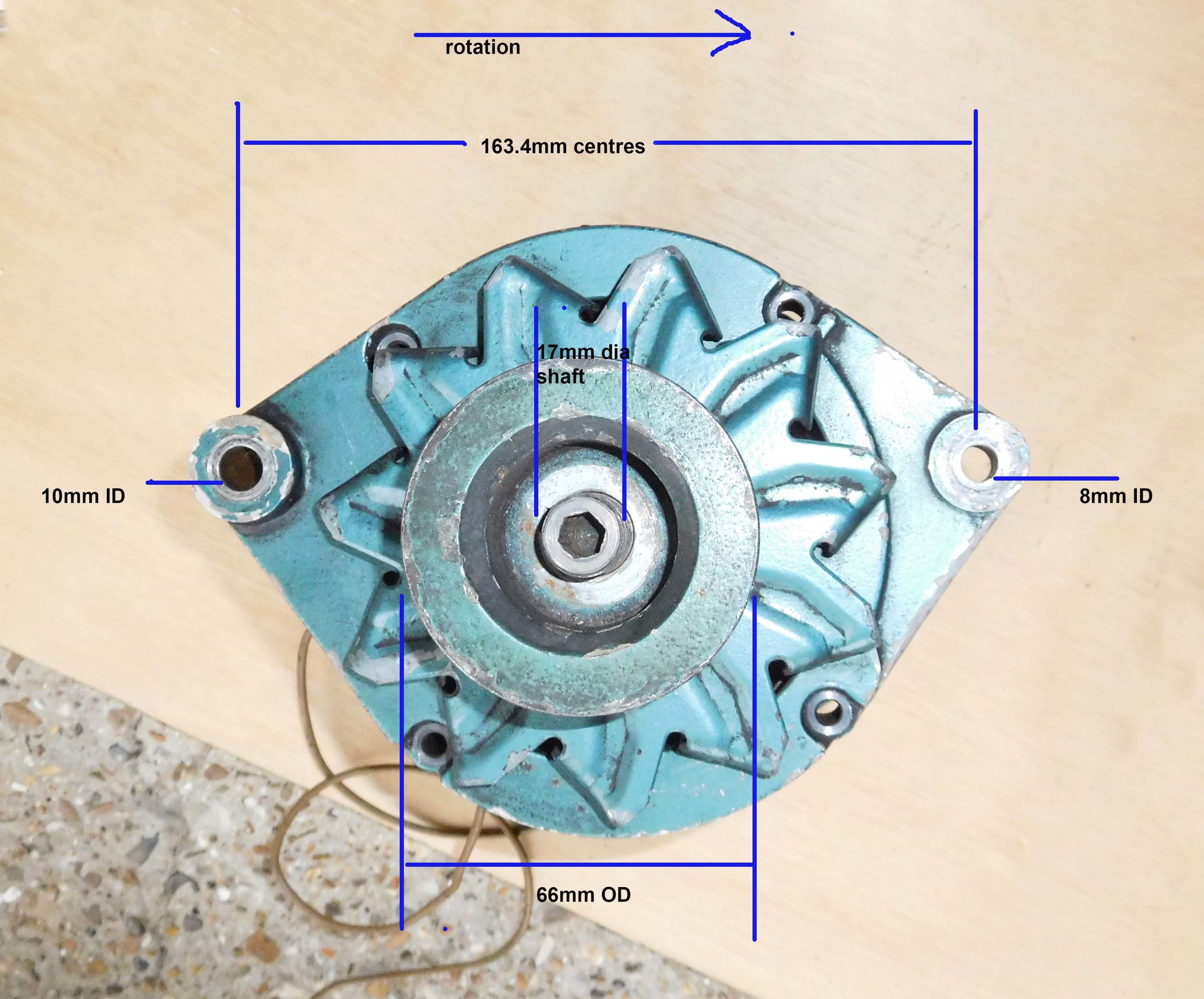
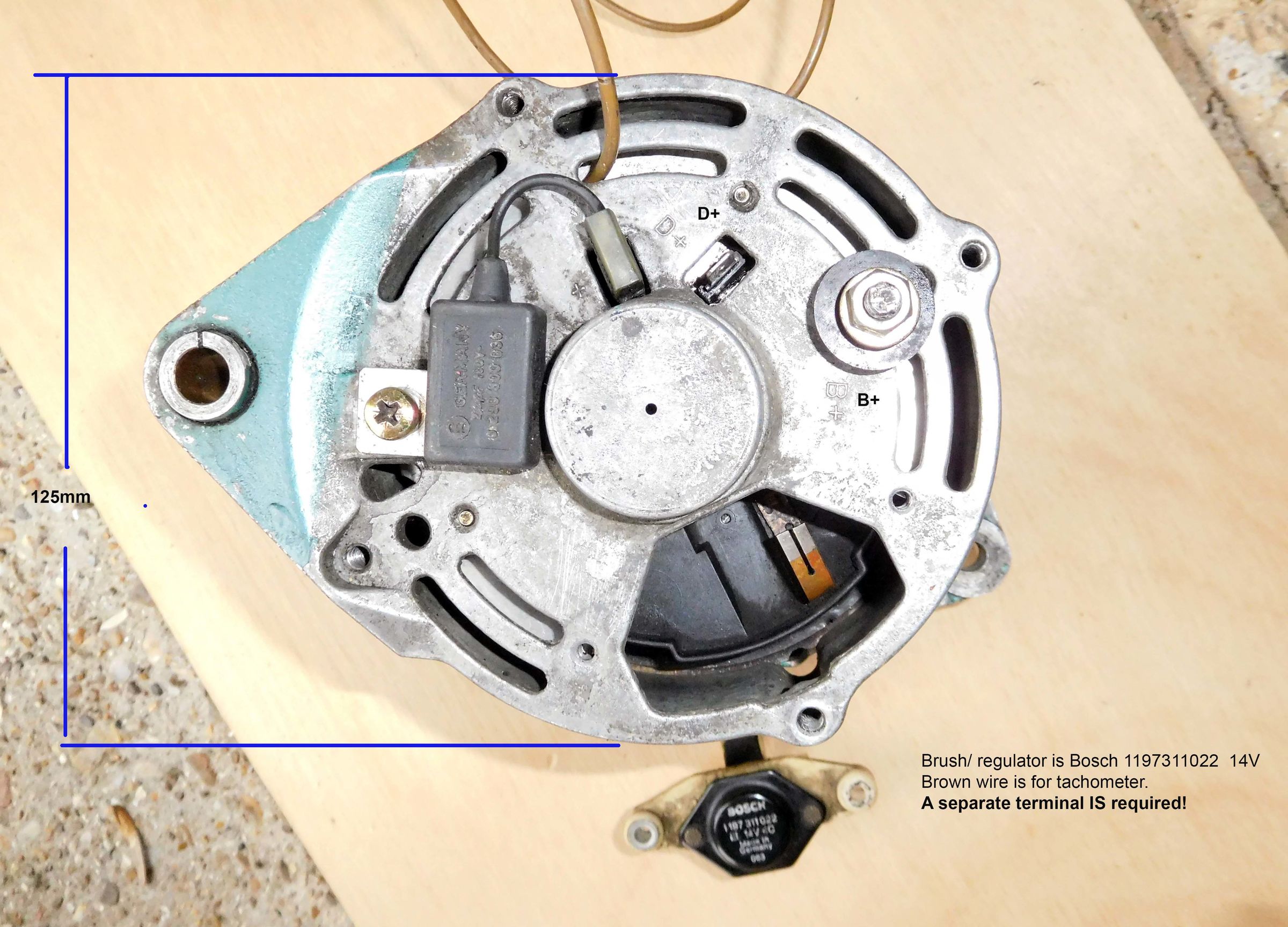

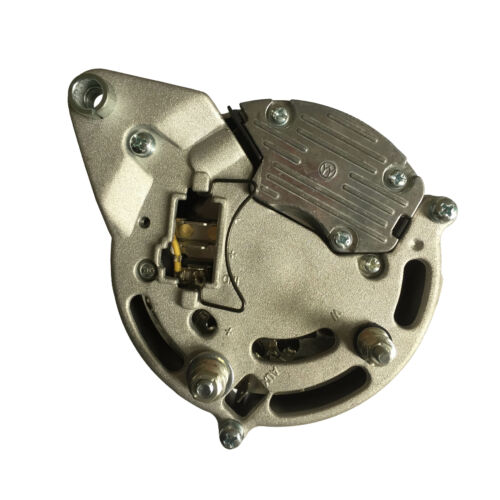

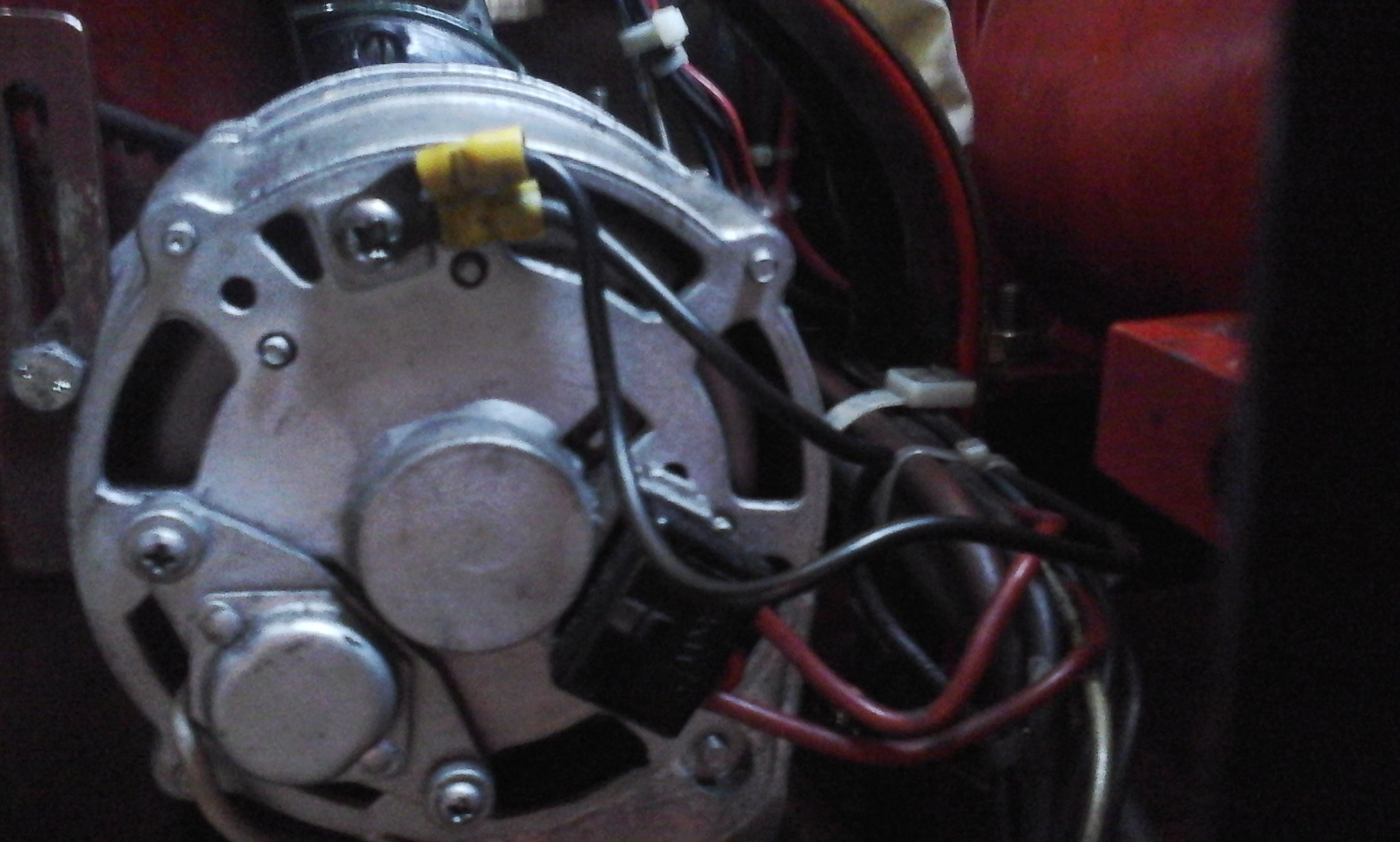
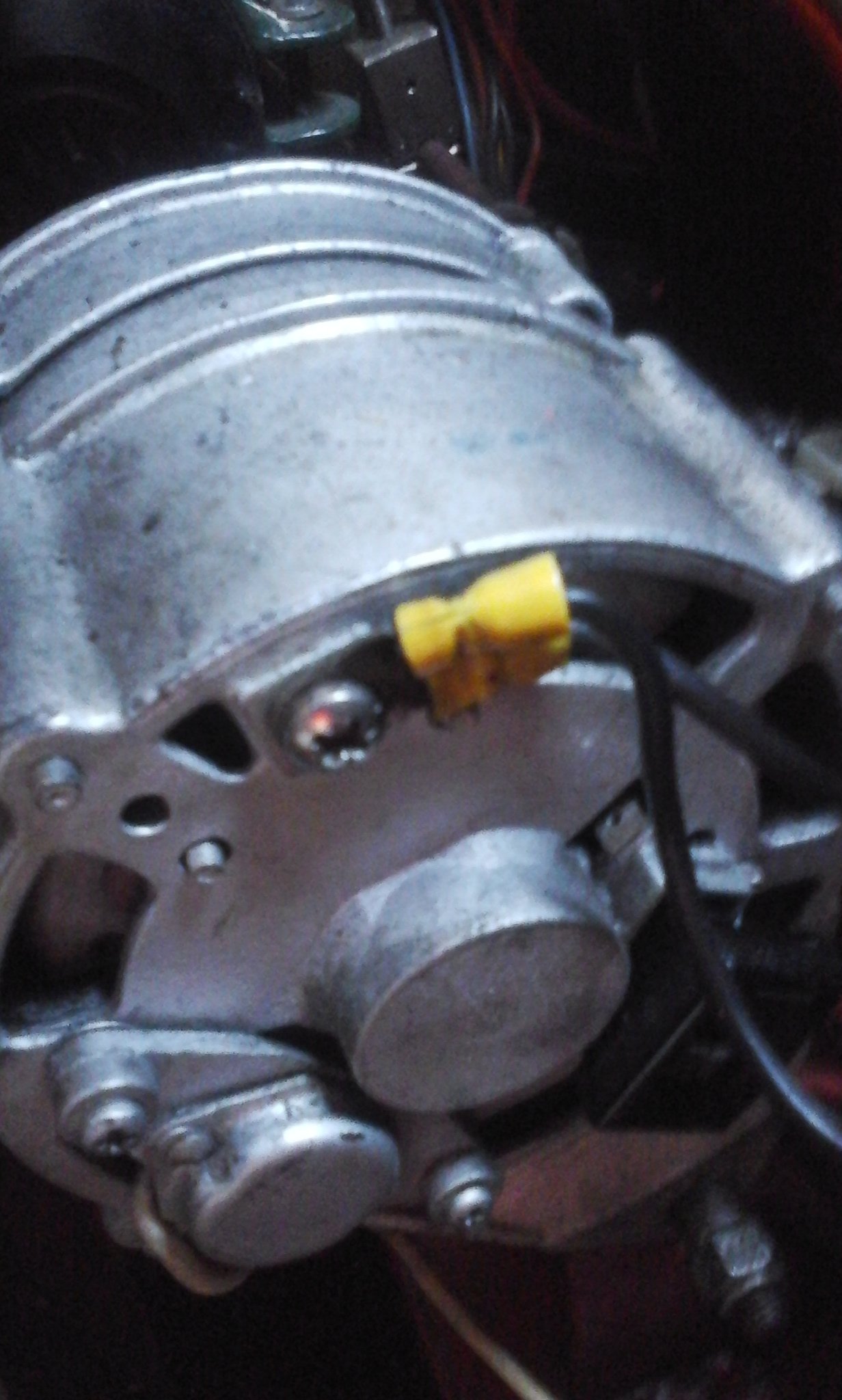

.jpg.c08890d79d39ba48da4ef567391aa7b3.jpg)
.jpg.68ac210af3c306cfc250a89c2e5143ba.jpg)
